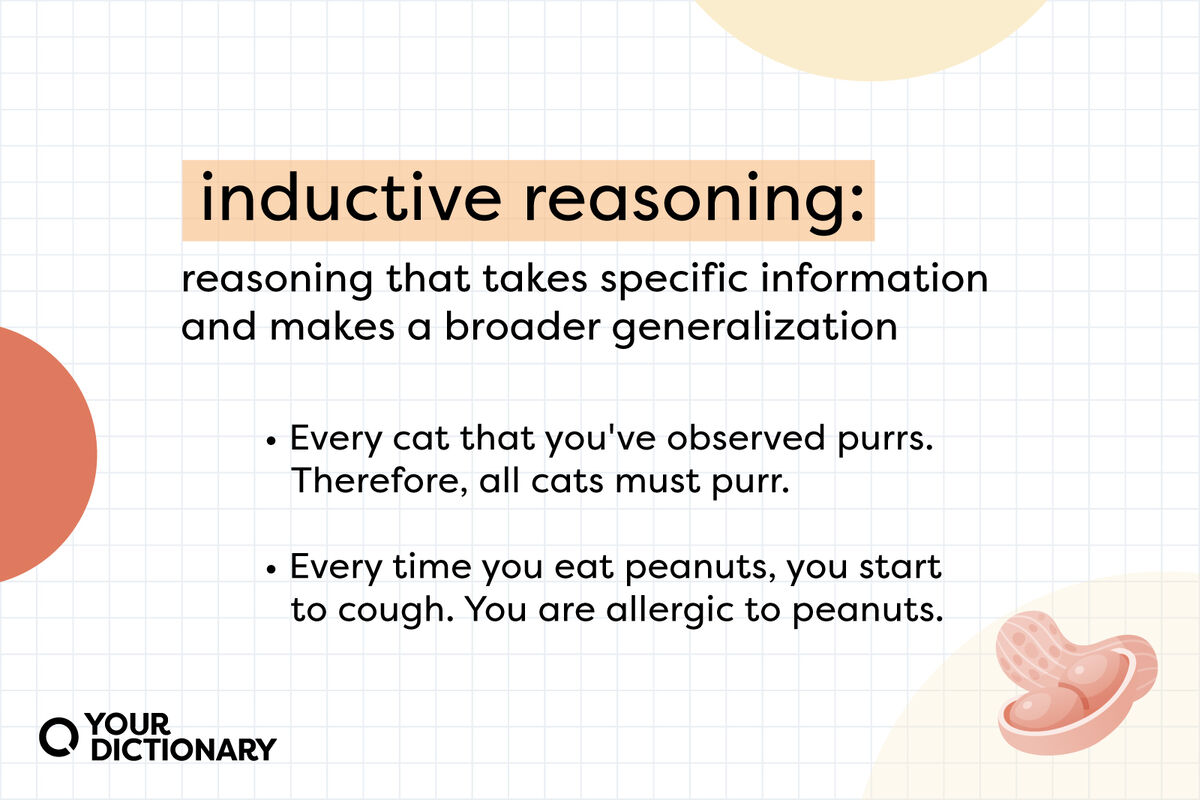
The term inductive reasoning refers to reasoning that takes specific information and makes a broader generalization that's considered probable while still remaining open to the fact that the conclusion may not be 100% guaranteed.
In other words, you're making an educated or informed guess based on the information or data that you have. It might sound right, but that doesn't mean it is right. Together, let's explore some examples of inductive reasoning. You'll quickly see what it's all about.
Types of Inductive Reasoning
There are varying degrees of strength and weakness in inductive arguments and reasoning. You’ll also find various types of common inductive reasoning including the following.
Inductive Generalizations
Using a small sample, you make a generalization about the whole population. For example:
The left-handed people I know use left-handed scissors; therefore, all left-handed people use left-handed scissors.
Statistical Induction
Similar to inductive generalizations, statistical induction uses a small set of statistics to make a generalization. For example:
Since 95% of the left-handers I’ve seen around the world use left-handed scissors, 95% of left-handers around the world use left-handed scissors.
Causal Inference
In causal inference inductive reasoning, you use inductive logic to draw a causal link between a premise and hypothesis. As an example:
In the summer, there are ducks on our pond. Therefore, summer will bring ducks to our pond.
Analogical Induction
In this type of inductive reasoning, you draw a hypothesis by analyzing two similar premises and their similarities like:
Mary and Jim are left-handed and use left-handed scissors.
Bill is also left-handed.
Conclusion: Bill also uses left-handed scissors.
Predictive Induction
This is where you might draw a conclusion about the future using information from the past. For example:
In the past, ducks have always come to our pond. Therefore, the ducks will come to our pond this summer.
These types of inductive reasoning work in arguments and in making a hypothesis in mathematics or science. Now, you’ve looked at the types of inductive reasoning, look at a few more examples to help you understand.
Examples of Inductive Reasoning
To get a better idea of inductive logic, view a few different examples. See if you can tell what type of inductive reasoning is at play.
- Jennifer always leaves for school at 7:00 a.m. Jennifer is always on time. Jennifer assumes, then, that if she leaves at 7:00 a.m. for school today, she will be on time.
- The cost of goods was $1.00. The cost of labor to manufacture the item was $0.50. The sales price of the item was $5.00. So, the item always provides a good profit for the stores selling it.
- Every windstorm in this area comes from the north. I can see a big cloud of dust in the distance. A new windstorm is coming from the north.
- Bob is showing a big diamond ring to his friend Larry. Bob has told Larry that he is planning to marry Joan. Bob must be surprising Joan with the diamond ring tonight.
- The chair in the living room is red. The chair in the dining room is red. The chair in the bedroom is red. All the chairs in the house are red.
- Every time you eat peanuts, you start to cough. You are allergic to peanuts.
- Every cat that you've observed purrs. Therefore, all cats must purr.
- Michael just moved here from Chicago. Michael has red hair. Therefore, all people from Chicago have red hair.
- The children in that house yell loudly when they play in their bedroom. I can hear children yelling in that house. Therefore, the children must be playing in their bedroom.
- Every chicken we've seen has been brown. All chickens in this area must be brown.
- John is an excellent swimmer. His family has a swimming pool. John's sister Mary must also be an excellent swimmer.
- All brown dogs in the park today are small dogs. Therefore, all small dogs must be brown.
- All the children in this daycare center like to play with Lego. All children must like to play with Lego.
- Ray is a football player. All the other football players on the high school team weigh more than 170 pounds. Therefore, Ray must weigh more than 170 pounds.
- Practically every house on South Street is falling apart. Sherry lives on South Street. Her house is probably falling apart.
- Every year we get a thunderstorm in May. Since it is May, we will get a thunderstorm.
Reserve Your Reasoning
As you can see, inductive reasoning borders on high probability. But, that doesn't make it necessarily factual. While you're at it, consider the sister to inductive reasoning: deductive reasoning. It's another form of logic that will help you draw valid conclusions.
To test your facts, you might want to consider formulating your own hypothesis. Then, you can test it by following these easy steps.